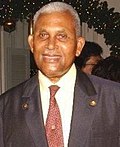6 November 1995 | |||||||||||||||||||||||||||||||||||||||||
All 36 seats in the House of Representatives 19 seats needed for a majority | |||||||||||||||||||||||||||||||||||||||||
|---|---|---|---|---|---|---|---|---|---|---|---|---|---|---|---|---|---|---|---|---|---|---|---|---|---|---|---|---|---|---|---|---|---|---|---|---|---|---|---|---|---|
| Turnout | 63.30% ( | ||||||||||||||||||||||||||||||||||||||||
| |||||||||||||||||||||||||||||||||||||||||
 | |||||||||||||||||||||||||||||||||||||||||
| |||||||||||||||||||||||||||||||||||||||||
Early general elections were held in Trinidad and Tobago on 6 November 1995, [1] after the ruling People's National Movement had seen its majority reduced to a single seat due to a defection and a lost by-election. [2] The results saw the PNM and the United National Congress both win 17 seats. Although they had received fewer votes, the UNC was able to form a coalition with the two-seat National Alliance for Reconstruction, allowing UNC leader Basdeo Panday to become the country's first Prime Minister of Indian descent. [3] Voter turnout was 63.3%. [2]


